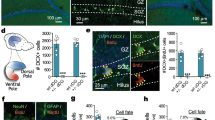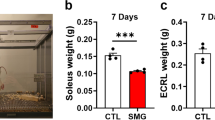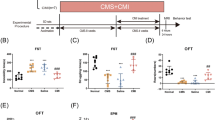Abstract
New-born cells continue to proliferate and survive to become mature granule cells in adult rat hippocampus. Although this process, known as neurogenesis, is inhibited by acute stress, it is not clear whether chronic stress affects neurogenesis. To determine whether chronic mild stress (CMS) influences neurogenesis in the adult rat hippocampus, male Sprague-Dawley rats were exposed to CMS and administered bromodeoxyuridine (BrdU) before or after CMS to observe the survival/differentiation or proliferation of new-born cells, respectively. In addition, we measured brain-derived neurotrophic factor (BDNF) mRNA in the granule cell layer (GCL) of the hippocampus, because BDNF is known to play an important role in the survival of new-born cells. CMS significantly decreased the survival of newborn cells in the GCL, but did not influence the proliferation or differentiation of new-born cells. CMS did not affect the proliferation and survival of new-born cells in the hilus. In addition, CMS did not change BDNF mRNA levels in the GCL. These results demonstrate that CMS reduces the survival of new-born cells but not of their proliferation, suggesting that repeated mild stress could influence a part of neurogenesis, but not the whole part of neurogenesis. These results raise the possibility that the survival of new-born cells may be suppressed in the presence of normal BDNF mRNA levels in GCL.
Similar content being viewed by others
Article PDF
Author information
Authors and Affiliations
Rights and permissions
This is an Open Access article distributed under the terms of the Creative Commons Attribution Non-Commercial License (http://creativecommons.org/licenses/by-nc/3.0/) which permits unrestricted non-commercial use, distribution, and reproduction in any medium, provided the original work is properly cited.
About this article
Cite this article
Lee, KJ., Kim, SJ., Kim, SW. et al. Chronic mild stress decreases survival, but not proliferation, of new-born cells in adult rat hippocampus. Exp Mol Med 38, 44–54 (2006). https://doi.org/10.1038/emm.2006.6
Published:
Issue date:
DOI: https://doi.org/10.1038/emm.2006.6
Keywords
This article is cited by
-
Adult-generated neurons born during chronic social stress are uniquely adapted to respond to subsequent chronic social stress
Molecular Psychiatry (2019)
-
Chronic stress triggers divergent dendritic alterations in immature neurons of the adult hippocampus, depending on their ultimate terminal fields
Translational Psychiatry (2019)
-
Unpredictable Chronic Mild Stress Suppresses the Incorporation of New Neurons at the Caudal Pole of the Chicken Hippocampal Formation
Scientific Reports (2019)
-
Effect of chronic unpredictable stress on mice with developmental under-expression of the Ahi1 gene: behavioral manifestations and neurobiological correlates
Translational Psychiatry (2018)
-
Neuroplasticity-dependent and -independent mechanisms of chronic deep brain stimulation in stressed rats
Translational Psychiatry (2015)



